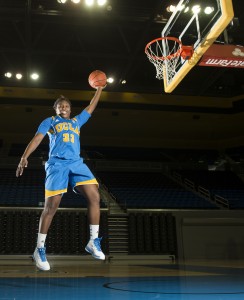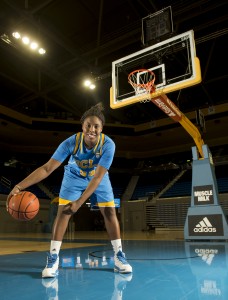Jasmine Dixon grew into the player she is today under the tutelage of her father: her life’s coach
Jasmine Dixon isn’t one for many words when she steps on the court, instead keeping her cool and composure at all times.
But that silence speaks volumes to her teammates. To them, she brings “a swagger and confidence” that they feed off, one that redshirt junior forward Atonye Nyingifa calls a “power energy.”
Even though Dixon isn’t a team captain, coach Cori Close is quick to point out how that doesn’t define the redshirt senior forward’s leadership skills.
“Leaders aren’t titles. Leaders are people who influence, and Jas influences,” Close said.
It’s an influence that has led UCLA to a 68-17 (.800) record in her four-year playing tenure, far and away better than its .591 winning percentage without her.
That success has been a lifelong trend for Dixon.
When she arrived at Long Beach Polytechnic High School, it went on to win three consecutive Division I state championships.
And when she switched travel teams in the ninth grade, her new squad went undefeated for two straight seasons, climbing to No. 1 in the national rankings.
“She just has a winning mentality. And it’s a lifestyle choice. It’s not something you can turn on and off,” Close said.
In between all the team success, Dixon has garnered some of the highest individual basketball accolades possible – from McDonald’s All-American and Gatorade California Player of the Year in high school to Honorable Mention AP All-American at UCLA.
But when Dixon looks past all that she has accomplished, she understands just how much she had to overcome along the way, and that she didn’t do it alone.
Making sacrifices
Dixon’s dad, Billy Brown, didn’t play a lot of basketball, but it was clear to him, early on, that his daughter was special.
He could see it in the way she tenaciously drove to the rim against older, stronger boys at the local park, unafraid of contact as just a six-year-old.
As Brown put it, “she was fearless.”
Dixon caught on to basketball fairly quickly, developing an instinctive feel for the game. Still, for her talent to blossom, she needed guidance, something that her dad provided unconditionally.
Not only did he coach many of her basketball teams up until high school, he took her under his wing for extra practices during that time. Together, they spent hours working on ball handling, footwork and other fundamental skills – week after week, year after year.
Even off the court, Brown didn’t stop preparing her.
When Dixon’s travel teams played road games – sometimes venturing across the country – he was there, ensuring she would get her eight hours of sleep.
“Any little thing he did was to make me better,” she said.
Over time, she emerged as one of the top young players in the nation.
But when Dixon, who soared above her competition, wanted to “chill out,” Brown pressed otherwise.
“I explained to her, ‘The Lisa Leslie’s don’t just chill out.’ … ‘The (Kobe Bryant’s) don’t just chill out to get to that level,’” he said. “You have to get out and sacrifice.”
At times though, it felt like nobody sacrificed as much as Brown did.
“I pretty much committed my life to raising Jasmine in basketball,” he said. “I sacrificed a lot. There were times where I should have been working or what not, and I was with Jas.”
Getting a second chance
At one point in his life, Brown found himself in his daughter’s shoes – a talented, young athlete ready to play at the college level.
A standout high school football safety, he had earned many Division I college scholarship offers.
But in a house with five other children, his parents never had ample time for him, and Brown slipped down the wrong path, getting caught up in gang activity.
“I knew I had decisions that I could make or not make, but I thought that particular life was the decision I was supposed to make because it was glorified, it was like ‘This is the thing to do,’” he said.
It cost him the coveted scholarship offers. Instead of forgetting about his misguided past, Brown used it as a blueprint to keep his daughter, who grew up in the same area as him, from making the same mistakes he did.
“I often tell Jas, ‘This is all about decision-making. It’s so easy to make a bad decision and get into major trouble. But sometimes it’s hard to make a wise decision and say, ‘Hey, I’d rather go the other route,’” Brown said.
Dixon’s family hovered around the poverty line for much of her childhood, and lived in a neighborhood clouded with gang activity.
But Dixon used basketball as her way out, spending almost all her time practicing and playing on any team possible.
When they would travel for basketball, many times to affluent neighborhoods, Brown rarely let her forget about her dream – their dream – that she was chasing.
“I (would) tell Jasmine, ‘Okay Jas, look at how all the cars start to look different now. Look at how all the houses are starting to look different now. This is where you want to get. … This is why we do what we’re doing. This is why you play basketball,” he said.
Going and coming
Brown said that it bothers him when talented Southern California high school girl’s basketball players bolt across the country to play for powerhouse college programs.
If they attended a local school such as UCLA or USC, they could build their own tradition here, he believes.
During the recruiting process, his daughter, who garnered offers from numerous top college programs, began seriously considering Rutgers University in New Jersey, almost 3000 miles from Long Beach.
“I was like, ‘Please don’t, for me and your family, you got a lot of fans here, (stay) here and start a tradition,’ because I wanted her to go to a close (Pac-12) school,” Brown said.
But he understood Dixon was becoming an adult; this was her decision.
She chose to attend Rutgers University, joining four other High School McDonald’s All-Americans in a heralded recruiting class deemed ‘The Next Fab Five.’
The talk of four straight Final Fours and multiple national championships spread throughout the campus before she and her teammates even played a game.
But the fit never quite matched the expectations.
Dixon and her fellow freshmen saw little playing time early, even though they had been recruited on the pretense that they would play right away. It was then she turned to her father, not for his help, but to receive reassurance from the man who had believed in her since day one.
“I had never had this happen, but Jasmine wrote a letter to me,” Brown said. “(She) was like, ‘I’m (going to) really work hard for you guys and represent our family well. I’m (going to) stay strong.’”
But to Brown, it was a sign that his daughter’s situation was serious. Soon thereafter, she called him and her mom, telling them she was ready to leave the program after just five games.
Dixon never had any doubt where she was going next – UCLA.
“It’s home. Thirty minutes from my house, my family,” Dixon said. “Why not have a new start and have my family with me?”
Pushing to the end
This season hasn’t gone quite as Dixon had planned.
She returned from a ruptured Achilles tendon that caused her to miss last season entirely, only to suffer a bone bruise to her leg earlier this season. It’s an injury that has hindered her all year.
‘This is probably one of the roughest seasons Jas has ever had,” Brown said. “She has played at a high level for all of (her) life. This is the first year her stats … don’t reflect her actual ability.”
Dixon is averaging just 7.8 points, 5.1 rebounds and 1.1 steals per game this season. Two years ago, she averaged 12.1 points, 7.3 rebounds and 2.4 steals per game, earning AP Honorable Mention All-American as the anchor of a UCLA team that finished with the most regular season and conference wins in school history.
Dixon’s precise footwork and lightning-quick hands haven’t changed. She still has the same physical strength down low that her teammate, Nyingifa, likens to that of the Hulk. But her aggressive “attack mentality” and explosiveness just aren’t what they used to be as she still regains her feel for the game.
She’s had to adjust her individual expectations for her final season, as has her dad.
Typically after home games, when the two of them speak, he’ll ramble on about game situations that Dixon could have done better in, because he’s never really stopped coaching her. But he understands that his daughter isn’t 100 percent just yet.
Instead, he asks her about her health and other things. How’s she’s feeling? Is she eating right? How’s school? But occasionally, he’ll slip in a pointer or two.
“I have to; it’s just in me and she’s used to it,” Brown said.
Still, Dixon understands her father’s relentless passion, and just how far it has brought her.
“Without my dad pushing me, I wouldn’t be here,” Dixon said.


